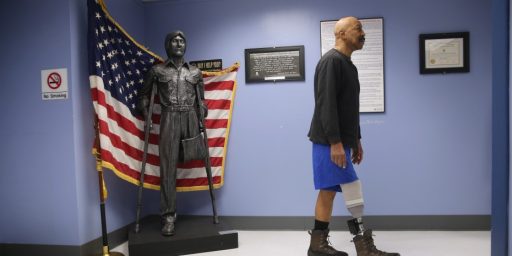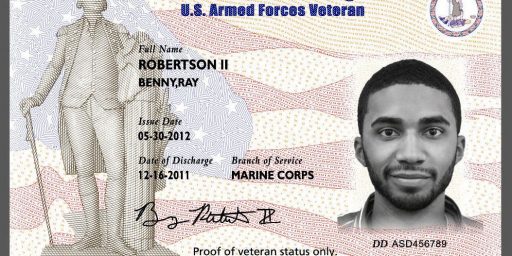VA Gave Bonuses For Shoddy Claim Processing
The VA created an incentive system that rewarded fast, half-assed claim processing that denied complicated requests.
The VA created an incentive system that rewarded fast, half-assed claim processing that denied complicated requests.
WaPo (“Despite Backlogs, VA Gives Staff Bonuses“):
While veterans waited longer than ever in recent years for their wartime disability compensation, the Department of Veterans Affairs gave its workers millions of dollars in bonuses for “excellent” performances that effectively encouraged them to avoid claims that needed extra work to document veterans’ injuries, a News21 investigation has found.
In 2011, a year in which the claims backlog ballooned by 155 percent, more than two-thirds of claims processors shared $5.5 million in bonuses, according to salary data from the Office of Personnel Management.
The more complex claims were often set aside by workers so they could keep their jobs, meet performance standards or, in some cases, collect extra pay, said VA claims processors and union representatives. Those claims now make up much of the VA’s widely scrutinized disability claims backlog, defined by the agency as claims pending more than 125 days.
Let’s be clear here: while the results (slip-shod work and denied legitimate claims) were easily predictable by people familiar with bureaucratic behavior, the goal (speeding up processing so that deserving disabled vets could start getting benefits more quickly) were laudable. An incentive system that rewards people for processing claims quickly naturally and obviously leads those tasked with processing claims to work on the easiest-to-resolve cases. Those that will impede progress towards achieving the bonus target will, at best, be set aside and, at worst, be denied. (Approving a questionable claim is likely to get flagged by supervisors, not only endangering one’s job but taking up time that could be devoted to easy cases that earn bonuses. Denied claims can get overturned on appeal and, if complicated, are unlikely to have any negative consequences for the denier.)
So, duh:
“At the beginning of the month . . . I’d try to work my really easy stuff so I could get my numbers up,” said Renee Cotter, a union steward for the Reno, Nev., local of the American Federation of Government Employees (AFGE).
Now, claims workers said, they fear the VA’s aggressive new push to finish all one-year-old claims by Oct. 1 — and eliminate the entire backlog by 2015 — could continue the emphasis on quantity over quality in claims processing that has often led to mistakes. VA workers have processed 1 million claims a year for three years in a row.
So, how’s it working out?
But documents show that a board of appeals found in 2012 that almost three out of four appealed claims were wrong or based on incomplete information.
Meanwhile, the workload piles up and the cases are getting harder, not easier:
The workload for VA claims workers also has doubled in the past five years. This included new claims from a quarter-million Vietnam veterans in 2010, when the VA added B-cell leukemias, Parkinson’s disease and ischemic heart disease to the growing list of health conditions for which veterans can claim because of exposure to the toxic chemical Agent Orange in Vietnam. In addition, more than 830,000 Iraq and Afghanistan war veterans returning home had filed claims as of March, according to VBA data.
According to 2012 data, the VA employed more than 11,000 claims processors or assistants. Most handle disability claims, while some deal with claims such as those for education and other benefits.
[…]
A processor must gather medical and military records for each disability and assign disability ratings based on the severity of injury, which then determines the monthly check from the government.
The VA paid $44.3 billion in disability benefits and $5.5 billion to survivors of veterans with a service-connected disability, according to its annual benefits report for fiscal 2012. A veteran who is rated 10 percent disabled receives a standard $129 per month.
Claims for multiple injuries require significant time to gather documentation. Other claims, including for post-traumatic stress disorder, military sexual trauma or traumatic brain injury, can require just as much effort because they can be more difficult to prove than physical injuries.
In April 2010, the VA stopped giving its employees performance credit for “supplemental development,” which included tasks such as calling and sending follow-up letters to veterans and follow-up requests for military documents and medical records.
The change was meant to encourage processors to finish claims. But a complex disability claim could take all day, while a claim for one or two injuries could be completed much faster, said David G. Bump, a national representative of the AFGE and former claims processor at the Milwaukee regional office.
[…]
Claims workers can be fired or demoted for not meeting standards in Automated Standardized Performance Elements Nationwide, or ASPEN, the VA’s system of awarding a specific number of points daily for each task an employee performs.
Performance evaluations for all claims workers include the elements of “productivity,” “quality” and “customer service.” While “quality” is measured by a random sampling of an employee’s claims and “customer service” is measured by the number of complaints against the employee, “productivity” is judged by ASPEN points, the average work credits the employee must earn per day.
Who could have predicted this would go sideways? Well, one would think, anyone with common sense. But the old system wasn’t working, political pressure was mounting, and something had to be done. A new software system was supposed to help alleviate the workload but, as always seems to happen with large, bureaucratic implementation in IT, it’s taken far longer than anticipated for it to go into place.







Well, what’s wrong with that? I thought we were supposed to run government like a business….?
I think you miss the big picture here James. Total pay for US military this year, which I think would be the equivalent of disability pay (Medical benefits being separate), is about $140 billion this year if I am reading this budget correctly. That means we are paying out another $50 billion/year for disability, largely due to the wars we have engaged in. Total VA expenses run about $140 billion this year. They are processing claims on what, about a quarter of the vets who served in our two recent wars? 11,000 processors? All that, and what do we have to show for it?
Back on topic, with a fixed number of employees, you can have either fast or good. You dont get both.
Steve
http://comptroller.defense.gov/defbudget/fy2014/amendment/fy2014_m1a.pdf
Reminds me of the old story about an incentive system set up for bus drivers. It seems the drivers would receive a bonus for arriving at certain key stops on time. They way they did that was by avoiding the delays inherent in picking up passengers along the way.
I just realized that if we had a comprehensive healthcare system like the Canadian one, this wouldn’t even be happening. Essentially, this is all about determining which part of the government pays for healthcare for the people who can’t afford it. To the Canadians, whether you are messed up from service or regular life is irrelevant, and all the effort can be put into just fixing it.
We prefer to have all the claims carefully evaluated by professionals capable of evaluating medical issues in ways that will stand up in court. A tedious, thankless, often heart-breaking, and utterly pointless task as anyone could wish to see.
@steve: I think it’s trying to get “fast, good, and cheap.” You can only get two out of the three.
What is amazing is that the article was written from the POV that the VA is not really part of the Executive Branch or that the Obama Administration has anything to do with the operations of the VA.
Also, what is amazing is how little attention these types of stories receive versus puff pieces about Sarah Palin.
@superdestroyer: I’ve been paying attention to bureaucratic politics for more than 20 years, going back to my dissertation. Presidents are surprisingly of little consequence. Dwight Eisenhower, war hero and former 5-star general, had very little impact in enacting the reforms of Defense he wanted.